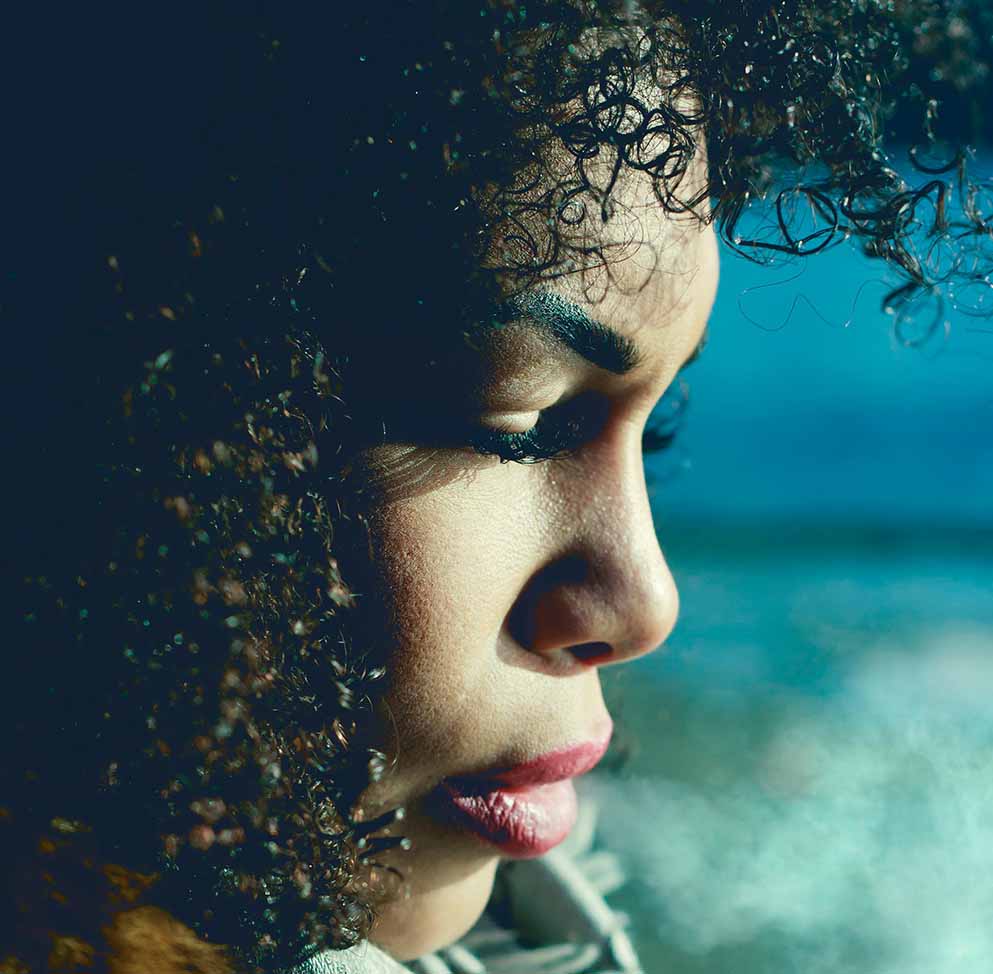Dandruff and Natural Hair
Dealing with dandruff issues over the course of your natural hair journey can be frustrating.
Dandruff not only gets in the way of your styling options, but a flaky scalp is a sign of an unhealthy scalp.
However, dandruff is a common occurrence and every natural suffers from it at some point in their hair journey. But with the right treatment and practices, an itchy, flaky scalp can be a thing of the past.
To better understand dandruff, we will be discussing:-
*Pssst, catch up on our effective Home Remedies for Dandruff.
1. What is the difference between dandruff and a dry scalp?
It is easy to confuse a dry scalp with dandruff as they present in the same way. But there is a big difference between dandruff and dry scalp.
With dry scalp, the skin gets irritated due to lack of moisture and begins to flake.
However dandruff, on the other hand, happens when excess oil and yeast cause skin cells to build up, shed and then flake off. This white, flaky shedding skin is known as dandruff.
In essence, dry scalp is caused by lack of moisture, while dandruff is caused by excess oil and yeast build-up.
While they both result in white, flaky skin, these are two different conditions are different and are treated in different ways.
2. What exactly is dandruff?
Dandruff is a scalp condition where small pieces of dry skin flake off from the scalp.
These flakes of skin will be noticeable on your hair, as well as where they deposit on your face and clothing (usually around the shoulders).
3. What are the symptoms of dandruff?

Dandruff has the following symptoms:-
• Itchy skin;
• Flaky skin;
• Hair loss; and
• Red patches on the scalp.
4. What causes dandruff?
Skin cells are constantly being renewed and the old cells being shed.
Dandruff occurs when the skin cells on your scalp multiply faster than normal, causing excessive flaking of the skin.
Dandruff is caused by a variety of factors:-
- Inflammation caused by poor diet;
- Stress;
- Aging;
- A fungus called Malassezia;
- Too much exposure to sunlight;
- Harsh products and chemicals;
- Not cleansing your hair properly, causing a build-up of oil; and
- Over cleansing your scalp with harsh products.
Is aging taking a toll on your hair. Read up on how to make the most of this transition caused by Perimenopause and Thinning Hair.
5. How to treat dandruff
The good news about dandruff is that is highly treatable.

Dandruff can be resolved by:-
- Using an anti-fungal shampoo;
- Incorporating regular scalp massages with peppermint oil.
There are many over the counter shampoos, as well as prescribed products that can treat the problem. However, it is wise to note that dandruff can recur, if you do not manage the conditions that led to getting dandruff in the first place.
A key factor therefore, is to practice prevention when it comes to dandruff, so that you can keep the white flakes at bay.
6. How to prevent dandruff during your natural hair journey?
Practice the following good hair practices to keep dandruff at bay:-
🌺Get out in the sun: It is advisable to spend a few minutes in the sun. The UV light from the sun helps keep dandruff at bay;
🌺Stay away from harsh products and chemicals: Avoid using products that can cause oil build-up on your scalp. Rather cleanse your scalp with a non-drying shampoo.
🌺Use an anti-dandruff shampoo: Wash your hair with the anti-dandruff shampoo and incorporate this into your hair regime. This will help maintain a clean, healthy scalp.
🌺Practice good hair hygiene: Be mindful of what you put on your scalp and how often you cleanse your scalp.
🌺Massage your scalp: Get into the habit of massaging your scalp, and include scalp-friendly products such as peppermint oil, tea tree oil and aloe vera gel.
A community that learns together, strives together. Our Natural Hair feature Christine shares her insights on Health over Length and other lessons learnt from 9 years natural.
7. What natural hair practices aggravate dandruff?
Fungus thrives in damp, wet environments.
Therefore natural hair practices that promote this environment is a big no – no, especially if you have / had dandruff.

To prevent dandruff, stop doing these during your hair routine:-
⛔Stop baggying your hair: Baggying your hair leaves your scalp wet for long periods. This is fertile ground for yeast to grow, which will cause more dandruff.
⛔Limit the time spent on your conditioning treatments: Limit this to the suggested minimum time and rinse your hair immediately afterwards.
⛔Do not air dry your hair when you have / are recovering from an outbreak of dandruff: When you have dandruff, air drying your hair is no longer an option. You will need to throughly dry your hair and scalp with a cotton cloth. Also to remove any residual dampness, consider blow- drying your hair on a low heat setting.
⛔Limit oil rinses and pre-pooing sessions until your scalp is healthy again.
⛔Do not use certain DIY treatments such as yoghurt, molasses and other DIY treatments that rely on food products in your pantry. These are fertile ground for yeast to grow.
⛔Take a break from co-washing: Rather properly cleanse your scalp with either ACV, a sulphate-free shampoo or a medicinal dandruff shampoo.
It is prudent to stop / limit these natural hair practices until your scalp issues are under control. Thereafter you can re-introduce them back into your hair regime with caution, paying attention to how your scalp behaves.
8. Conclusion
At the end of the day, a healthy scalp will contribute to healthy hair, so make sure you prioritise your scalp as you would the skin on your face.
Should your dandruff not get better and your scalp become swollen or inflamed, then consult your medical doctor. Dandruff is treatable, as long as you take the right action.
Have you struggled with dandruff before? Are you still struggling? Let us hear about your experience in the comments below.
Until the next time, happy naturaling ladies.

